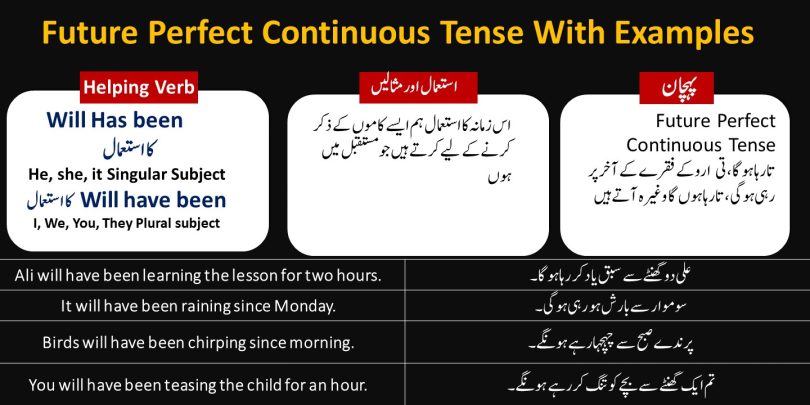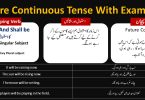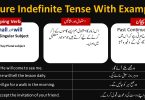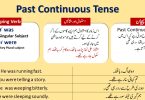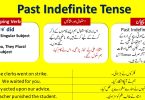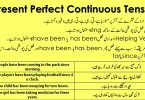Introduction:
In this blog, you will learn future perfect Continuous Tense with Urdu To English Examples. If you are a beginner and want to improve your English grammar, you must learn tense. Tenses are key to the English language, without learning Tenses you can’t improve your English grammar and speaking. There are a total of 12 tenses in English grammar. In the first section, you will learn the introduction of future perfect continuous tense. In 2nd section, you will learn simple sentences of future perfect continuous tense. In 3rd section, you will learn negative sentences of Future perfect continuous tense with Urdu Examples. 4th section of this blog you will learn future perfect interrogative sentences with Urdu to English examples.
Future Perfect Continuous Tense With Urdu To English Examples
پہچان: ارو کے فقرے کے آخر پر تا رہا ہوگا، تی رہی ہوگی، تا رہا ہوں گا وغیرہ آتے ہیں۔
اس میں فعل کی چوتھی حالت استعما ل ہوتی ہے ۔امدادی فعل will have been یا shall have been کا استعمال ہوتا ہے۔
بنانے کا طریقہ: سب سے پہلے فاعل ‘ اس کے بعد been will haveیا have been shallاور پھر چوتھی حالت اور آخر پر مفعول استعمال ہوتا ہے اور آخر for یا since استعمال ہوتا ہے۔
Future Perfect Continuous Tense With Simple Sentences Examples
In the below table, you will learn future perfect continuous Tense with Simple Urdu to English sentences. Just scroll down and learn and learn these sentences.
| Ali will have been learning the lesson for two hours. | علی دو گھنٹے سے سبق یا د کر رہا ہوگا۔ |
| It will have been raining since Monday. | سوموار سے بار ش ہو رہی ہوگی۔ |
| Birds will have been chirping since morning. | پرندے صبح سے چہچہا رہے ہونگے۔ |
| You will have been teasing the child for an hour. | تم ایک گھنٹے سے بچے کو تنگ کر رہے ہونگے۔ |
| He will have been making mischief for three days. | وہ تین دن سے شرارت کر رہا ہوگا۔ |
| These men will have been diving since 2 o’clock. | یہ آدمی 2 بجے سے غوطہ لگا رہے ہونگے۔ |
| Flood will have been coming into the river for many hours. | دریا میں کئ سالوں سے سیلاب آرہا ہوگا۔ |
| The farmer will have been ploughing for four hours. | کسان چار روز سے ہل چلا رہا ہوگا۔ |
| The people will have been drawing water out of the well since 4 o’clock. | لوگ چار بجے سے کنویں سے پانی سے نکال رہے ہونگے۔ |
| Women will have been quarrelling since noon. | عورتیں د و پہر سے لڑتی رہی ہوں ہوگی۔ |
| Some people will have been fasting since Monday and Sunday. | کچھ آدمی اتوار سے روز رکھ رہے ہونگے۔ |
| We shall have been making tea for fifteen minutes. | ہم پندرہ منٹ سے چائے تیار کر رہے ہونگے۔ |
| The pious man will have been praying for two hours. | نیک آدمی دوگھنٹے سے دعا مانگ رہا ہوگا۔ |
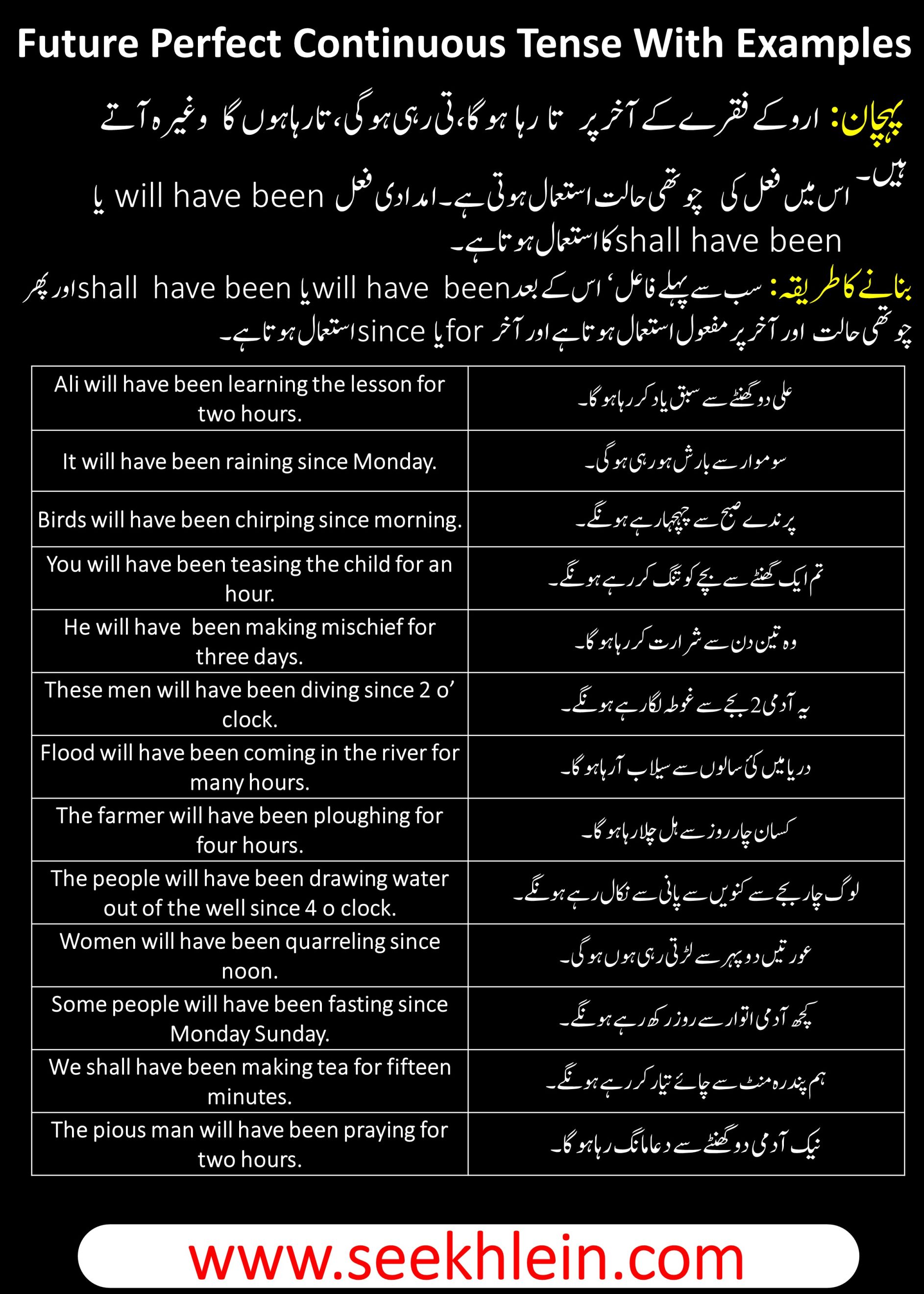
Future Perfect Continuous Tense With Simple Sentences Examples
Future Perfect Continuous Tense With Negative Sentences Examples
In the table below, you will learn future perfect Continuous Tense with Negative Urdu to English sentences. Just scroll down and learn and learn these sentences.
| I will not have been studying for three hours by the time you arrive. | جب تک تم پہنچو گے، میں تین گھنٹے سے پڑھ نہیں رہا ہوں گا۔ |
| She will not have been cooking for two hours by the time the guests come. | جب تک مہمان آئیں گے، وہ دو گھنٹے سے کھانا نہیں پکا رہی ہو گی۔ |
| They will not have been living here for ten years by next year. | اگلے سال تک، وہ یہاں دس سال سے نہیں رہ رہے ہوں گے۔ |
| He will not have been working on this project for six months by June. | جون تک، وہ اس منصوبے پر چھ مہینے سے کام نہیں کر رہا ہو گا |
| We will not have been traveling for a week by the time we reach home. | جب تک ہم گھر پہنچیں گے، ہم ایک ہفتے سے سفر نہیں کر رہے ہوں گے۔ |
| You will not have been waiting for him for an hour by the time he arrives. | جب تک وہ پہنچے گا، تم ایک گھنٹے سے اس کا انتظار نہیں کر رہے ہو گے۔ |
| She will not have been teaching at this school for five years by next month. | اگلے مہینے تک، وہ اس اسکول میں پانچ سال سے نہیں پڑھا رہی ہو گی |
| He will not have been exercising for three months by the end of this year. | اس سال کے آخر تک، وہ تین مہینے سے ورزش نہیں کر رہا ہو گا۔ |
| They will not have been building the house for a year by next December. | اگلے دسمبر تک، وہ ایک سال سے گھر نہیں بنا رہے ہوں گے۔ |
| I will not have been working at this company for ten years by next June. | اگلے جون تک، میں اس کمپنی میں دس سال سے کام نہیں کر رہا ہوں گا۔ |
| We will not have been waiting for the bus for two hours by 5 PM. | شام پانچ بجے تک، ہم دو گھنٹے سے بس کا انتظار نہیں کر رہے ہوں گے |
| She will not have been reading this book for a month by next week. | اگلے ہفتے تک، وہ اس کتاب کو ایک مہینے سے نہیں پڑھ رہی ہو گی۔ |
| He will not have been driving for five hours by the time he reaches home. | جب تک وہ گھر پہنچے گا، وہ پانچ گھنٹے سے گاڑی نہیں چلا رہا ہو گا |
| They will not have been learning French for six months by the end of this course. | اس کورس کے اختتام تک، وہ چھ مہینے سے فرانسیسی زبان نہیں سیکھ رہے ہوں گے۔ |
| We will not have been staying in this hotel for a week by Friday. | جمعہ تک، ہم اس ہوٹل میں ایک ہفتے سے نہیں ٹھہرے ہوں گے۔ |
| I will not have been staying here for the last 3 hours. | میں یہاں 3 گھنٹے سے نہیں رک رہا ہوں۔ |
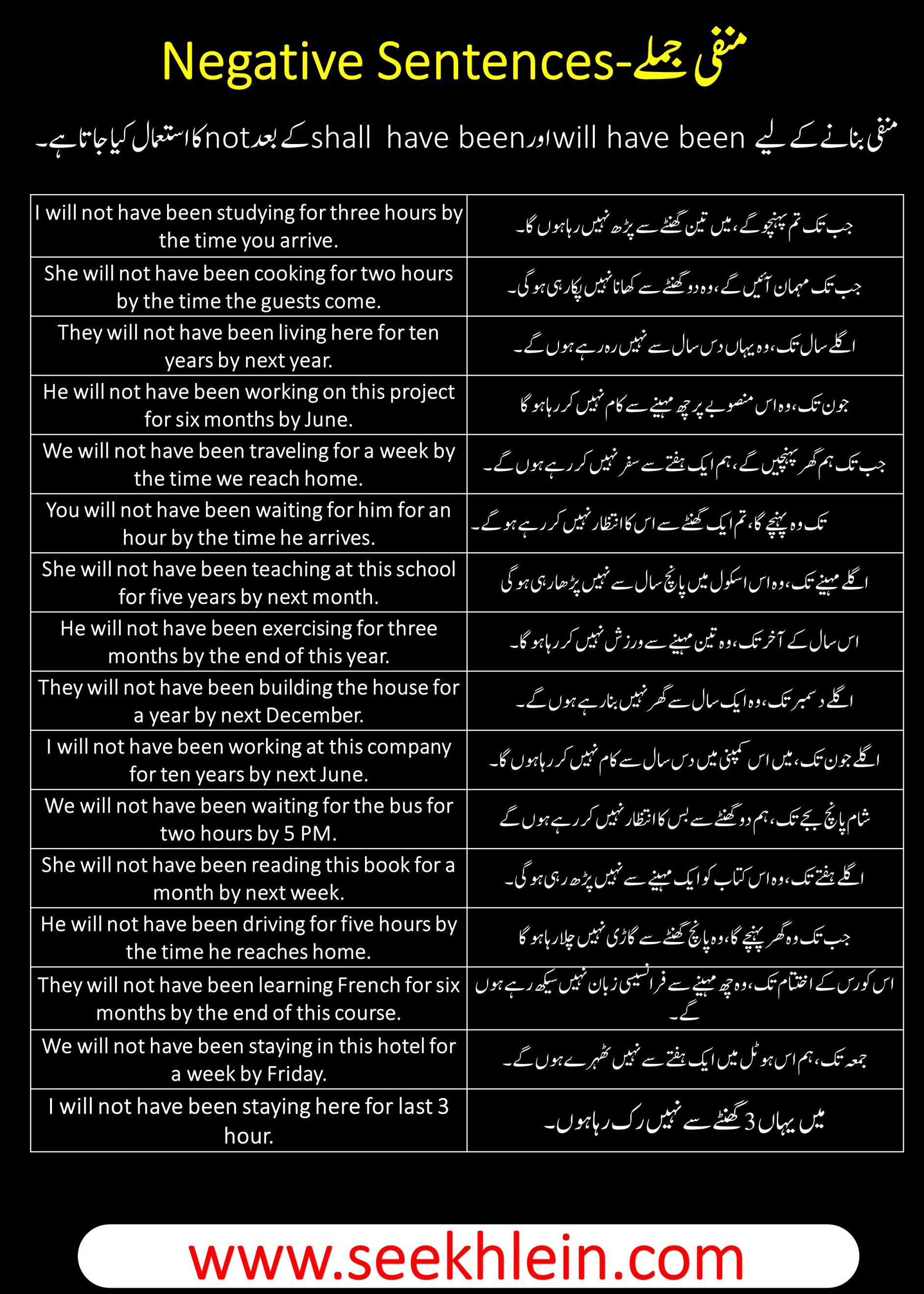
Future Perfect Continuous Tense With Negative Sentences Examples
Future Perfect Continuous Tense With Interrogative Sentences Examples
In the table below, you will learn future perfect Continuous Tense with Interrogative Urdu to English sentences. Just scroll down and learn and learn these sentences.
Interrogative Sentences-سوالیہ جملے
سادہ سوالیہ بنانے کے لیے فاعل سے پہلے will have been یا shall have beenاور آخر پر سوالیہ نشان آتا ہے۔
| Will she have been teaching at this school for five years by next year? | کیا وہ اگلے سال تک اس اسکول میں پانچ سال سے پڑھا رہی ہو گی؟ |
| Will he have been working on this project for three months by the time it is finished? | کیا وہ اس منصوبے پر جب تک یہ مکمل ہو گا، تین ماہ سے کام کر رہا ہو گا؟ |
| Will they have been living in this city for a decade by 2025? | کیا وہ 2025 تک اس شہر میں دس سال سے رہ رہے ہوں گے؟ |
| Will I have been studying for the exams for two weeks by the end of this week? | کیا میں اس ہفتے کے آخر تک دو ہفتے سے امتحانات کی تیاری کر رہا ہوں گا؟ |
| Will she have been cooking for three hours by the time the guests arrive? | کیا جب مہمان پہنچیں گے، تب تک وہ تین گھنٹے سے کھانا بنا رہی ہو گی؟ |
| Will you have been waiting for the bus for half an hour by then? | کیا آپ تب تک آدھے گھنٹے سے بس کا انتظار کر رہے ہوں گے؟ |
| Will they have been playing football for two hours by 5 PM? | کیا وہ شام پانچ بجے تک دو گھنٹے سے فٹبال کھیل رہے ہوں گے؟ |
| Will he have been traveling for six months by the end of the year? | کیا وہ سال کے آخر تک چھ ماہ سے سفر کر رہا ہو گا؟ |
| Will we have been learning French for a year by the next semester? | کیا ہم اگلے سمسٹر تک ایک سال سے فرانسیسی سیکھ رہے ہوں گے؟ |
| Will she have been practicing piano for three hours by tonight? | کیا وہ آج رات تک تین گھنٹے سے پیانو کی مشق کر رہی ہو گی؟ |
| Will he have been driving for four hours by the time they reach their destination? | کیا وہ جب اپنی منزل پر پہنچیں گے، تب تک چار گھنٹے سے گاڑی چلا رہا ہو گا؟ |
| Will you have been exercising for an hour by the time I get home? | کیا آپ جب تک میں گھر پہنچوں، ایک گھنٹے سے ورزش کر رہے ہوں گے؟ |
| Will they have been watching TV for five hours by midnight? | کیا وہ آدھی رات تک پانچ گھنٹے سے ٹی وی دیکھ رہے ہوں گے؟ |
| Will she have been writing her novel for six months by this summer? | کیا وہ اس گرمیوں تک چھ ماہ سے اپنا ناول لکھ رہی ہو گی؟ |
| Will you have been working at this company for ten years by 2030? | کیا آپ 2030 تک اس کمپنی میں دس سال سے کام کر رہے ہوں گے؟ |
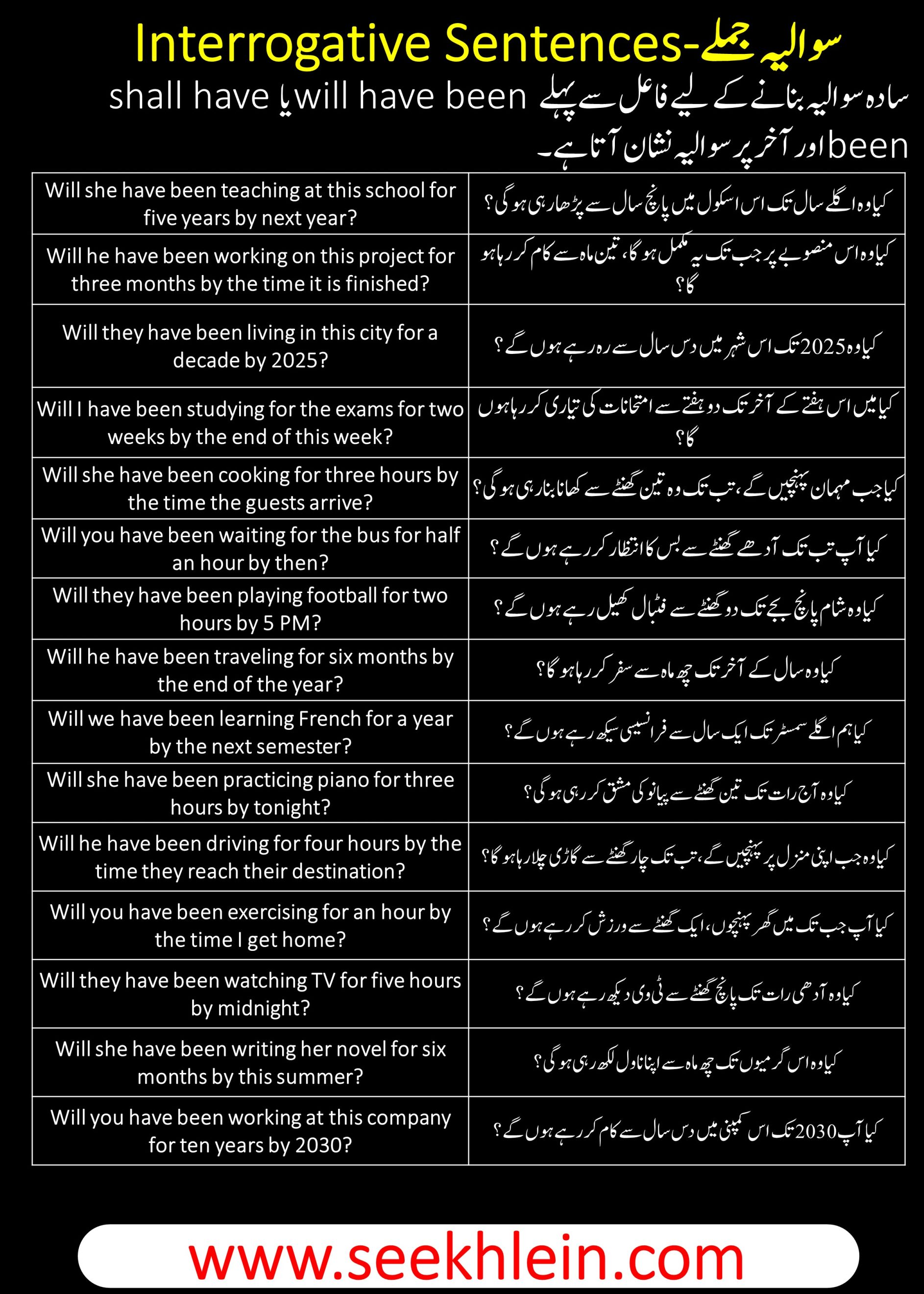
Future Perfect Continuous Tense With Negative Sentences Examples
Future Perfect Continuous Tense With Double Interrogative Sentences Examples
In the below table, you will learn Future Perfect Continuous Tense with Interrogative Urdu to English sentences. Just scroll down and learn and learn these sentences.
Double Interrogative Sentences-سوالیہ جملے
ڈبل سوالیہ بنانے کے لیےالفاظwho, why, what, when, where, howکو سادہ سوالیہ فقرات کےشروع میں استعمال کیا جاتا ہے۔
| Where will she have been teaching for five years by next year? | وہ اگلے سال تک پانچ سال سے کہاں پڑھا رہی ہو گی؟ |
| How long will he have been working on this project by the time it is finished? | جب یہ مکمل ہو گا، تو وہ اس منصوبے پر کتنے عرصے سے کام کر رہا ہو گا؟ |
| Why will they have been living in this city for a decade by 2025? | وہ 2025 تک دس سال سے اس شہر میں کیوں رہ رہے ہوں گے؟ |
| What will I have been studying for two weeks by the end of this week? | اس ہفتے کے آخر تک میں دو ہفتے سے کیا پڑھ رہا ہوں گا؟ |
| When will she have been cooking for three hours by the time the guests arrive? | جب مہمان پہنچیں گے، تو وہ تین گھنٹے سے کب کھانا بنا رہی ہو گی؟ |
| Where will you have been waiting for the bus for half an hour by then? | تب تک آپ آدھے گھنٹے سے کہاں بس کا انتظار کر رہے ہوں گے؟ |
| How long will they have been playing football by 5 PM? | شام پانچ بجے تک وہ کتنے عرصے سے فٹبال کھیل رہے ہوں گے؟ |
| Why will he have been traveling for six months by the end of the year? | سال کے آخر تک وہ چھ ماہ سے سفر کیوں کر رہا ہو گا؟ |
| What will we have been learning for a year by the next semester? | اگلے سمسٹر تک ہم ایک سال سے کیا سیکھ رہے ہوں گے؟ |
| When will she have been practicing piano for three hours by tonight? | : آج رات تک وہ تین گھنٹے سے کب پیانو کی مشق کر رہی ہو گی؟ |
| How long will you have been exercising by the time I get home? | جب میں گھر پہنچوں گا، تو آپ کتنے عرصے سے ورزش کر رہے ہوں گے؟ |
| Why will they have been watching TV for five hours by midnight? | آدھی رات تک وہ پانچ گھنٹے سے ٹی وی کیوں دیکھ رہے ہوں گے؟ |
| What will she have been writing for six months by this summer? | اس گرمیوں تک وہ چھ ماہ سے کیا لکھ رہی ہو گی؟ |
| How long will you have been working at this company by 2030? | تک آپ کتنے عرصے سے اس کمپنی میں کام کر رہے ہوں گے؟ |
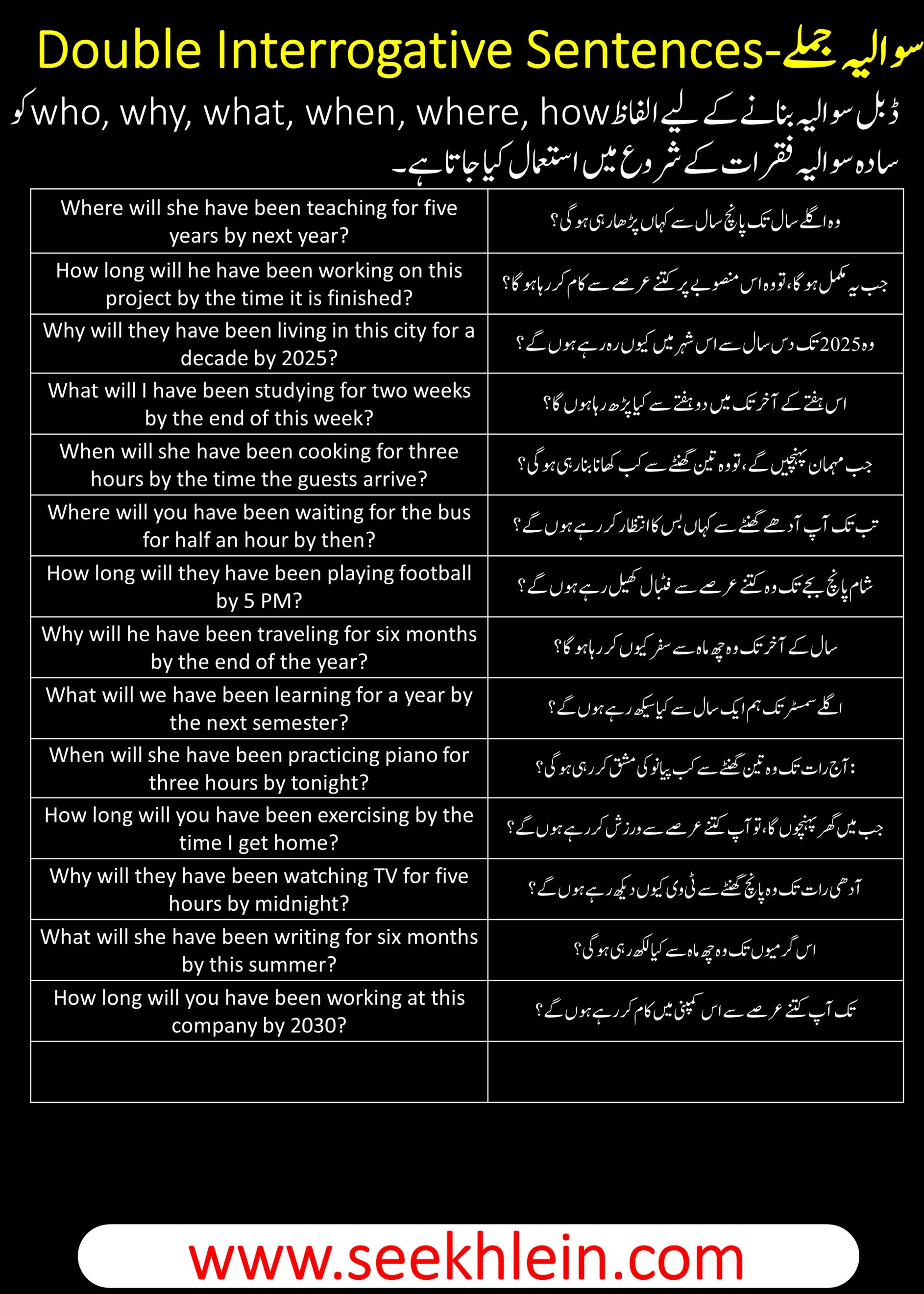
Also Read;

